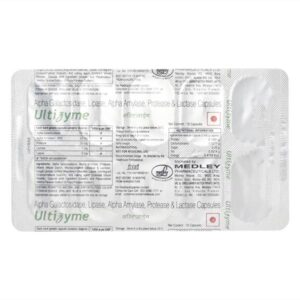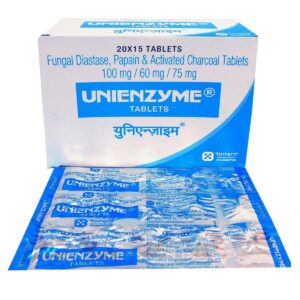FUNGAL DIASTASE + PAPAIN + ACTIVATED CHARCOAL
Fungal Diastase: Drug: Fungal Diastase
Use: Fungal Diastase is primarily used as a digestive enzyme supplement. It helps in the digestion of carbohydrates, especially starchy foods, by breaking down complex carbohydrates into simpler sugars.
Mechanism of Action: Fungal Diastase contains the enzyme diastase, which is derived from the fungus Aspergillus oryzae. Diastase works by hydrolyzing the alpha-1,4-glycosidic linkages in starch, converting it into maltose and other small oligosaccharides. These simpler sugars can be easily absorbed by the body, providing energy.
Dose: Fungal Diastase is available in tablet or capsule form. The recommended dose may vary depending on the brand and specific formulation. Generally, it is advised to take 1-2 tablets or capsules with meals, or as directed by a healthcare professional. It is important to read the product label and follow the instructions provided.
Side Effects: Fungal Diastase is generally well-tolerated, and serious side effects are rare. However, some individuals may experience minor gastrointestinal disturbances such as bloating, flatulence, or diarrhea. These side effects are usually mild and resolve on their own. If any adverse reactions persist or worsen, it is advisable to consult a healthcare professional.
It is important to note that Fungal Diastase is not a medication to treat any specific medical condition. It is primarily used as a digestive support supplement to aid in the digestion of carbohydrates. Individuals with specific digestive disorders or underlying medical conditions should consult a healthcare professional before starting any new medication or supplement, including Fungal Diastase.
Papain: Papain is an enzyme derived from the papaya fruit. It is primarily used as a digestive aid, as it helps break down proteins in the digestive system.
The mechanism of action of papain is mainly through its proteolytic activity. It works by breaking down protein molecules into smaller peptides and amino acids, facilitating their absorption in the gastrointestinal tract. This can help improve digestion and alleviate symptoms such as bloating, gas, and indigestion.
Papain is available in the form of tablets, capsules, and powders. The recommended dose may vary depending on the product and the individual’s needs. It is typically taken orally before or after meals, following the dosage instructions provided by the manufacturer or as directed by a healthcare professional.
The side effects of papain are generally mild and uncommon. Some possible side effects include allergic reactions such as skin rashes or itching, gastrointestinal upset, or irritation of the oral mucosa in sensitive individuals. In rare cases, high doses of papain may cause vomiting, diarrhea, or abdominal cramps.
It is important to note that individuals who are allergic to latex may also be sensitive to papain, as they share some similar proteins. Therefore, individuals with latex allergies should exercise caution when using papain and consult with a healthcare professional before starting any supplements or medications containing this enzyme.
As with any medication or supplement, it is advisable to consult with a healthcare professional before starting papain, especially for individuals with underlying health conditions or those taking other medications, as drug interactions can occur.
Activated Charcoal: Activated charcoal is a medication used for the treatment of drug overdose and poisoning. It is a type of carbon that has been treated to make it porous, which increases its surface area and adsorptive properties.
Activated charcoal works by adsorbing toxins and chemicals in the gastrointestinal tract, preventing their absorption into the bloodstream. It binds to the toxic substances and carries them out of the body through the process of elimination.
The dosage of activated charcoal depends on the patient’s weight and the severity of the poisoning. Generally, for adults, the recommended dose is 50-100 grams, while for children, it is 1-2 grams per kilogram of body weight. It is usually administered orally as a suspension or mixed with water.
While activated charcoal is generally considered safe, it can have some side effects. These include black stools, vomiting, diarrhea, and constipation. These side effects are usually temporary and harmless. Rarely, there can be complications such as aspiration of charcoal into the lungs or bowel obstruction if large amounts are ingested.
It is important to note that activated charcoal may not be effective for all types of poisoning. It is most effective when administered soon after ingestion and for certain drugs and toxins. It is not effective for chemicals such as alcohol, heavy metals, or certain acids and bases. Therefore, it is crucial to consult a healthcare professional or contact a poison control center before using activated charcoal in case of poisoning.


